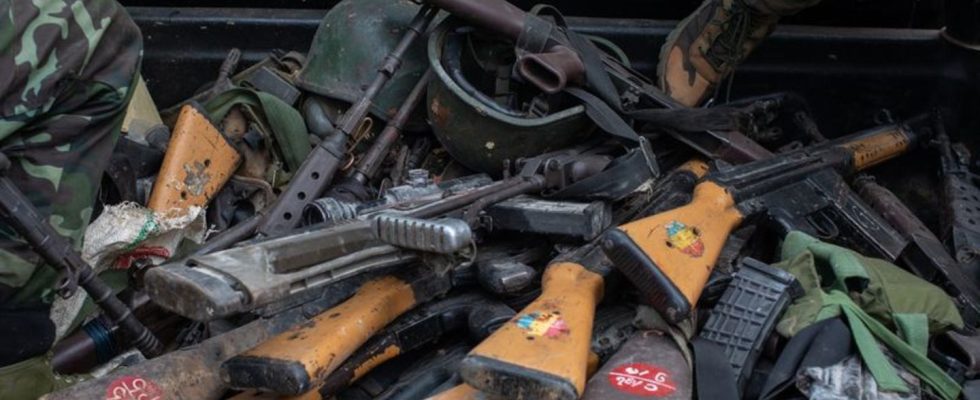In large parts of Myanmar, resistance fighters are rehearsing an uprising and are inflicting heavy losses on the military junta. China is also involved – it’s about fraud factories. Is the former Burma in danger of falling apart?
Something is moving in Myanmar. While the situation in the crisis country, which was torn by a brutal junta, seemed static for a long time, armed groups have risen against the army in recent weeks – with remarkable success.
The generals seem perplexed. The president they appointed, Myint Swe, has already openly warned of the disintegration of the former Burma. “2023 is set to be the worst year the Myanmar army has seen since the 1960s,” journalist Wai Moe, a former political prisoner, wrote in an op-ed.
There has been particularly fierce fighting since October 27 in northern Shan State on the border with China, a region known for drug trafficking and gambling and considered a lawless region. In keeping with the date, the fighters are calling their offensive “Operation 1027.”
Within a few days, the so-called Brother Alliance – a guerrilla alliance made up of three ethnic groups – said it had gained control of important trade routes to China as well as more than 180 bases and outposts. In the important towns of Chinshwehaw and Pansai, flags of the armed opposition are now flying instead of Myanmar’s national flag. The army responds with air strikes, but it doesn’t make any progress on the ground. At the same time, according to UN figures, tens of thousands of civilians are on the run.
Fight on multiple fronts
The alliance, which has many experienced resistance fighters, consists of three groups: the Myanmar National Democratic Alliance Army (MNDAA), the Ta’ang National Liberation Army (TNLA) and the Arakan Army (AA). All are traditionally close to China, Myanmar’s most important trading partner. Beijing, which is planning major projects in the region as part of its new Silk Road, plays an important role in the conflict.
“We have occupied large cities on the border between China and Myanmar,” said Li Kyar Wen, a spokesman for the MNDAA, to the German Press Agency. More than 200 junta soldiers were killed and hundreds more surrendered. At the same time, arms and ammunition from the army were confiscated. Given the confusing situation, the reports cannot be independently verified. But observers say the military faces its biggest challenge since its February 2021 coup.
On the one hand, this has to do with the fact that fighting is taking place on several fronts and in different parts of the country. In the course of the offensive, armed groups have also risen up against the military in other states and taken over towns and military posts – for example in Chin State on the border with India and Bangladesh, in Karenni State in the far east, in Rakhine State and in Kachin state and in the Sagaing region.
Chinese gangs and fraud factories
But the morale of the junta troops is now at an all-time low. Since the overthrow and arrest of Nobel Peace Prize winner Aung San Suu Kyi, the soldiers have felt the full hatred of the population. In many places, the generals can hardly find any young people who want to fight for them.
But what role does China play? As is often the case, the People’s Republic appears to be using the conflict for its own interests. However, the current situation is complicated: Although Beijing maintains diplomatic relations with the junta, at the same time there are traditionally close contacts with the guerrilla groups.
In the border area of the huge Shan State, which makes up about a quarter of Myanmar, not only drug trafficking but also casinos and so-called fraud factories run by Chinese gangs are booming. Most of the people working there are from Myanmar, Laos or Cambodia, who were lured with the promise of a lucrative job – but are then forced to commit criminal acts. They are supposed to use fake accounts to persuade wealthy people in the West to transfer money or invest in cryptocurrencies.
Striving for self-determination and democracy
These factories run by dubious cartels are a thorn in the side of the leadership in Beijing. She has long urged the junta in Myanmar to do something about the machinations – with limited success. The guerrilla groups have now apparently promised to put an end to the fraud factories as part of their offensive. Beijing will likely tolerate “Operation 1027” and the resulting instability in the border region if it solves the problem of online fraud factories, said Nan Lwin, a China expert at ISP-Myanmar, a nonpartisan think tank.
The MNDAA says its next plan is to attack Laukkai, the capital of the Kokang region. Formerly an important opium-growing region, the area is now considered a center for online gambling and cyber fraud.
It is currently impossible to predict what the nationwide offensives will mean in the long term. It seems certain that many ethnic groups in the multi-ethnic state are pursuing a similar goal: the end of the generals and self-determination. “Across the country, we are currently fighting together against the military regime to pave the way for the establishment of a federal democracy,” said Khun Beedu, leader of the Karenni Nationalities Defense Force (KNDF). “While there may be collateral damage and casualties during the operations, the ultimate goal is the complete eradication of the junta.”

